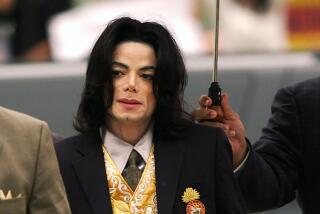Judge Lets Jackson Plead 5th : Courts: The singer avoids answering questions in civil case about whether he molested children. His lawyers say they advised the legal move even though he is innocent.
- Share via
A Superior Court judge ruled Thursday that pop superstar Michael Jackson can plead the 5th Amendment in a civil case, enabling him to avoid answering questions under oath about whether he sexually abused children.
Attorney Charles Mathews, representing five former Jackson security guards who have filed suit against Jackson claiming that he fired them to conceal his child molestation, said Jackson is hiding behind the 5th Amendment.
“Michael Jackson had the opportunity today to come into court and say he is innocent,” Mathews said after the hearing. Instead, Matthews said, Jackson “gets up and says, ‘Sorry, I want to take the 5th because my answer could incriminate me.’ ”
Jackson’s attorneys said the singer wanted to testify that he was innocent, but given that he may face criminal charges, his defense team advised Jackson to stay silent.
Jackson “maintains that he is innocent,” said Carl Douglas, his attorney, accusing Mathews of grandstanding. “As an experienced criminal attorney, (Mathews) knows full well the obligations of one’s counsel when they are facing serious charges.”
Jackson has not been charged with a crime. A grand jury disbanded in July without indicting the singer, but the statute of limitations on child molestation charges runs six years, and the district attorney’s office has not said Jackson is in the clear.
Mathews, who had wanted Superior Court Judge Richard C. Neal to force Jackson to admit or deny firing the guards as part of a cover-up, complained that this was the first time a defendant had used the 5th Amendment in not answering allegations in a civil suit.
“I found not even one (similar civil) case,” Mathews said, “and the 5th Amendment has been around for a long time.”
Neal said he had to “fall back on basic principles, and the basic principle is a fairly simple one, that we don’t use our judicial process to make someone incriminate themselves.”
The guards, all fired Feb. 1, 1993, sued Jackson in November. In the suit, they said they had seen boys between the ages of 9 and 14 going into Jackson’s private quarters in his Hayvenhurst Avenue estate in Encino and not emerging until the next morning.
The suit also alleges that one guard, Leroy A. Thomas, was ordered to retrieve a Polaroid photo of a naked boy from Jackson’s private bathroom and destroy it.
Mathews said the guards had cooperated with the district attorney’s office and filed the suit, which is scheduled for trial in April, after they became convinced that charges would not be lodged against Jackson. Mathews called his clients “good men, moral men.”
Another of Jackson’s attorneys, Zia Modabber, has another view. “They want money,” he said Thursday. “They don’t want (Jackson) to admit or deny anything for any real purpose.”
More to Read
The biggest entertainment stories
Get our big stories about Hollywood, film, television, music, arts, culture and more right in your inbox as soon as they publish.
You may occasionally receive promotional content from the Los Angeles Times.









